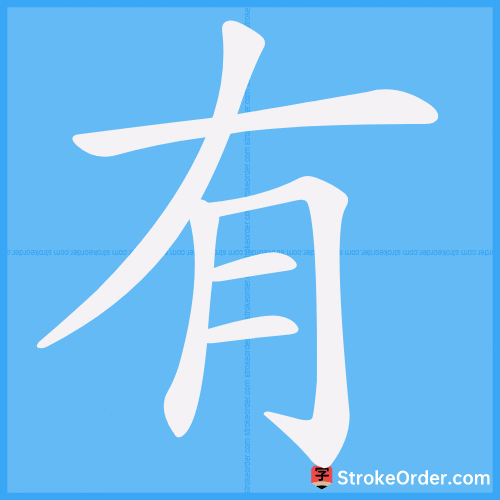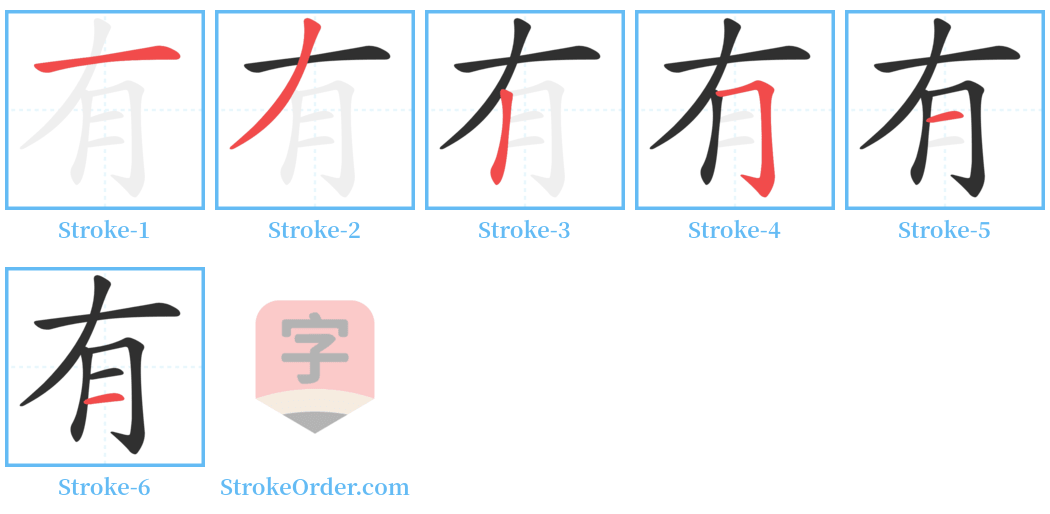有 Stroke Order
Animated Stroke Order of 有

Stroke Order Diagrams for 有

Step-by-Step Handwriting Guide for 有

Learn to Write Chinese Characters with Video Tutorials
Watch the video of writing the Chinese character "有", learn the correct stroke order (笔顺) of the character "有", and master the standard way of writing the character "有".
Free Printable Handwriting Practice with Stroke Order: 有
Printable Writing Practice Worksheet of "有" in Portrait Orientation (Tian Zi Ge)

Printable Writing Practice Worksheet of "有" in Landscape Orientation (Tian Zi Ge)

Information of 有
Pinyin
yǒu、 yòu
Radical
月
Strokes
6 strokes
Usage
★★★★★
Definition
to have / there is / there are / to exist / to be
有 [yǒu]
1. 存在: to exist.
2. 表示所属: to indicate possession.
3. 表示发生、出现: to indicate occurrence or appearance.
4. 表示估量或比较: to indicate estimation or comparison.
5. 表示大、多: to indicate magnitude or plurality.
6. 用在某些动词前面表示客气: used before certain verbs to express politeness.
7. 无定指,与“某”相近: indefinite reference, similar to "some".
8. 词缀,用在某些朝代名称的前面: a prefix used in the names of certain dynasties.
Examples:
1. 存在: ~关 (there is a concern). ~方(得法)(there is a method). ~案可稽 (there are cases to reference). ~备无患 (if prepared, there is no worry). ~目共睹 (there is common witness).
2. 表示所属: 他~一本书 (He has a book).
3. 表示发生、出现: ~病 (to get sick). 情况~变化 (the situation is changing).
4. 表示估量或比较: 水~一丈多深 (the water is more than ten feet deep).
5. 表示大、多: ~学问 (to have great knowledge).
6. 用在某些动词前面表示客气: ~劳 (to trouble). ~请 (please).
7. 无定指,与“某”相近: ~一天 (one day).
8. 词缀,用在某些朝代名称的前面: ~夏 (the Xia dynasty). ~宋一代 (the Song dynasty period).
有 [yǒu] (verb)
1. 同本义 (same basic meaning): to have; possess.
2. 存在 (to exist).
3. 取得,获得,占有 (to obtain; to possess).
4. 等候,等待 (to wait).
5. 发生,呈现;产生 (to happen).
Examples:
1. 有功 (to have merit).
2. 有根有苗 (to have foundation and leads).
3. 有理走遍天下 (to go anywhere with logic).
4. 有时节 (to have a time).
5. 有盼头 (to have hope; bright future).
有 [yǒu] (adjective)
1. 用在“人”、“时候”、“地方”前面,表示一部分 ([En.] some): 有人说可以 (some people say it is possible).
2. 表示不定指 ([En.] one): 有一天他来我家 (one day he came to my home).
3. 表示过去有一段 ([En.] means a certain time in the past): 有一年 (one year), 有一天 (one day).
有 [yǒu] (adverb)
1. 用于某些动词前组成套语,表示客气 (used before certain verbs to express politeness): 有请 (please), 有劳 (thank you for your trouble).
2. 相当于“或” (equivalent to "or"): 或许 ([En.] perhaps).
有 [yòu] (variant)
1. 通“又” ([En.] same as “又”).
2. 另见 yǒu (see also "有").
expect everyone to do his duty / Each and everyone should hold himself responsible for his country's welfare. / Every common man has his obligation.
to hold in storage / to retain / to harbor (feelings) / to entertain (sentiments) / (of abstract things) to exist / there is
Input Method for 有
Pinyin
you3
Wubi
def
Cangjie
kb
Zhengma
gdq
Four Corner
40227
Unicode
U+6709
Same Pronunciation Characters